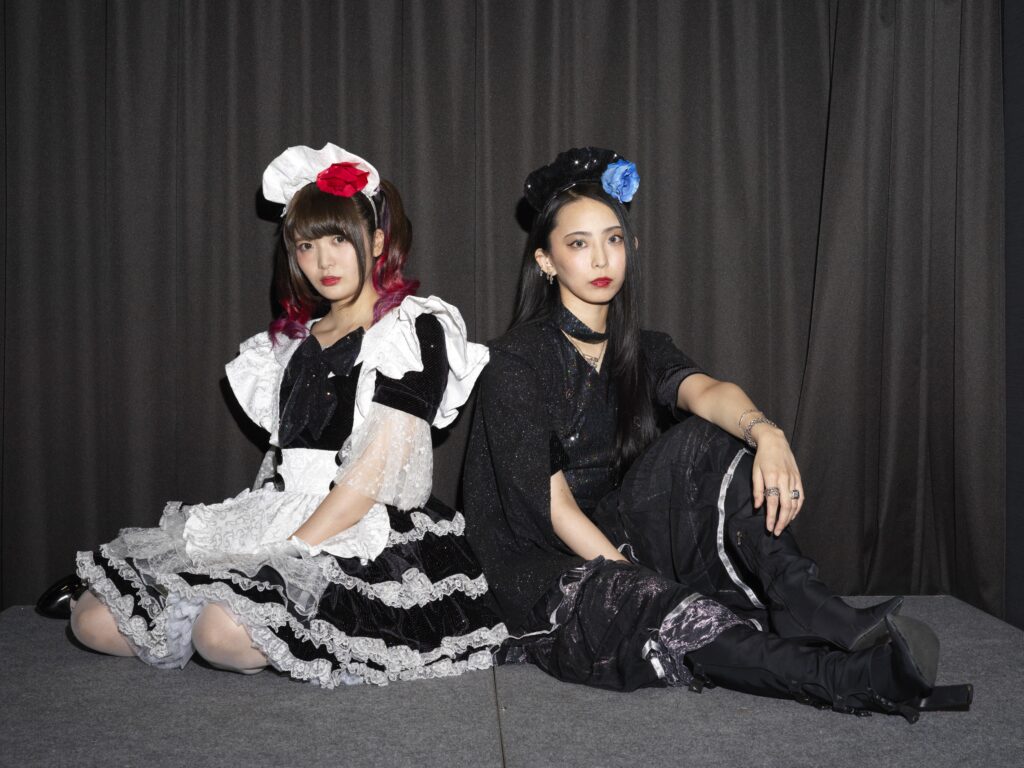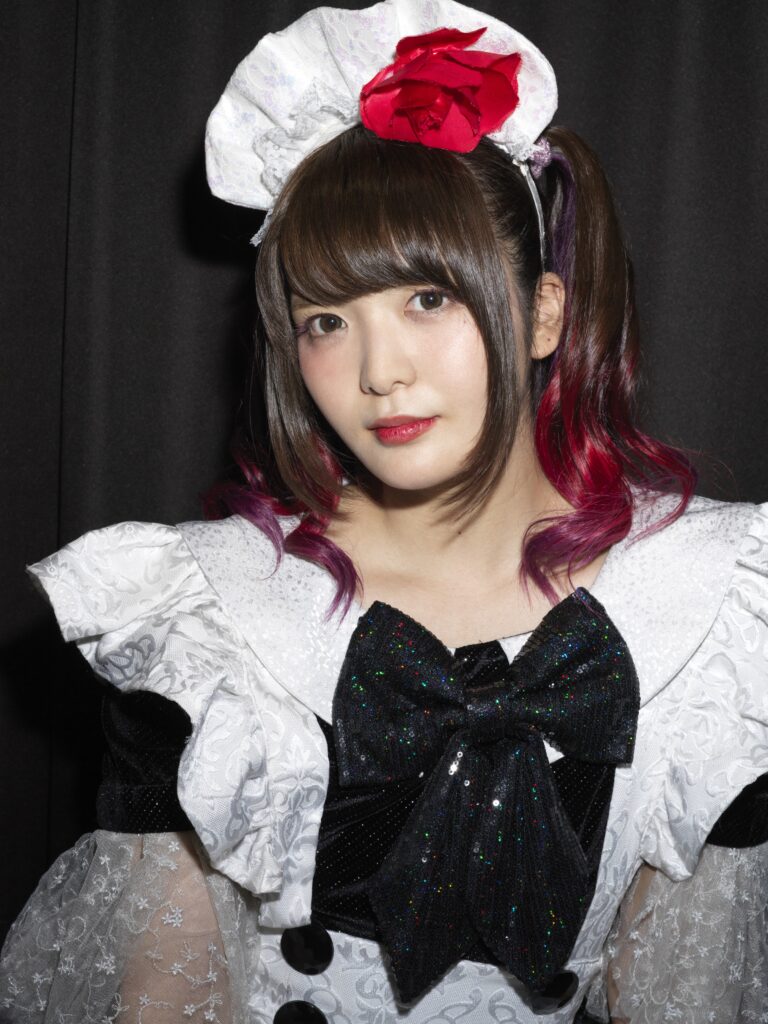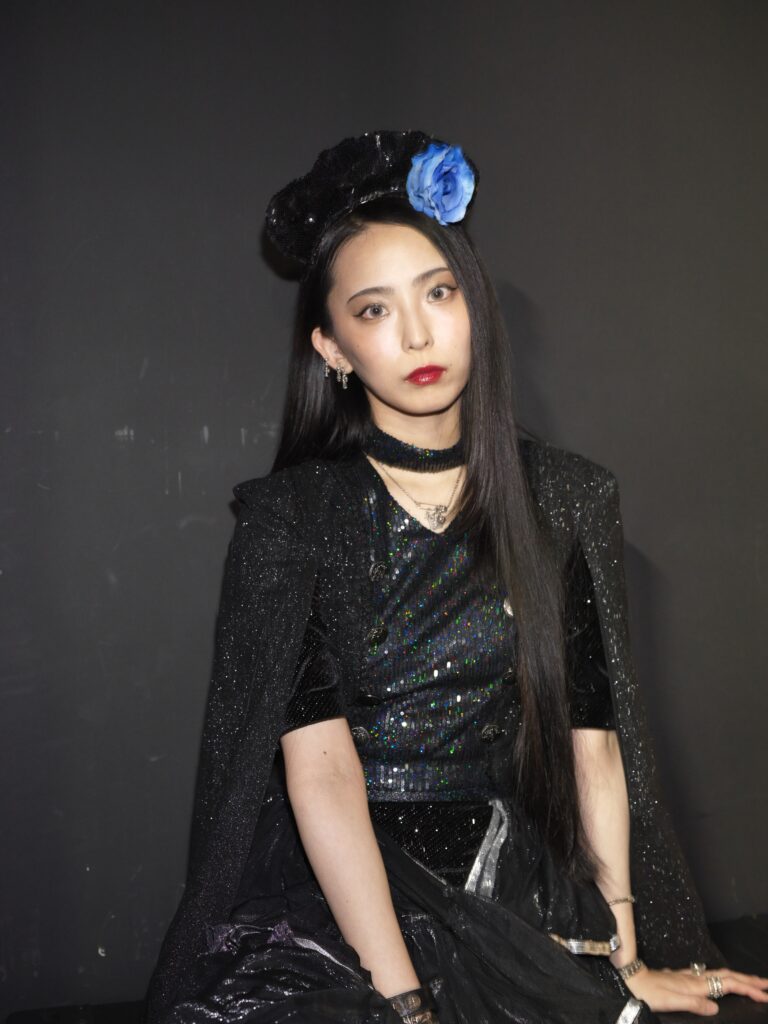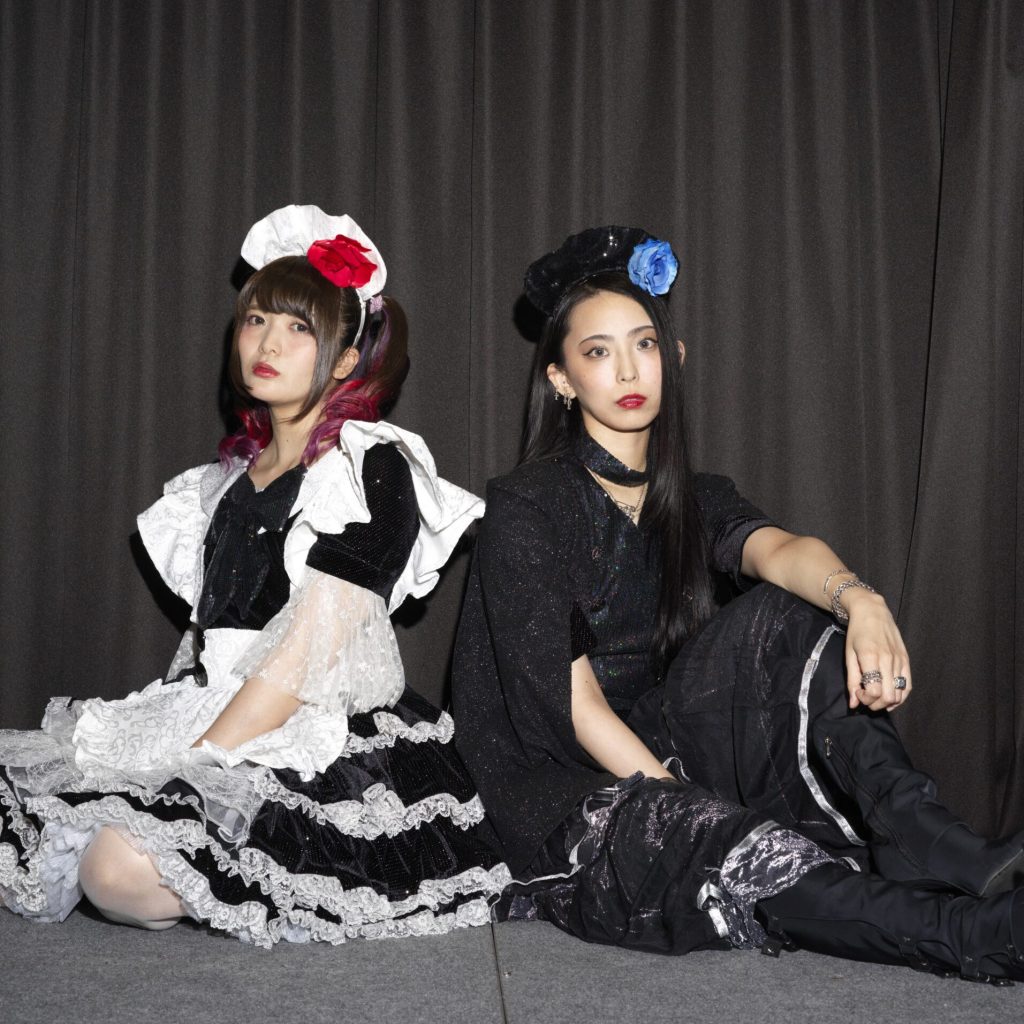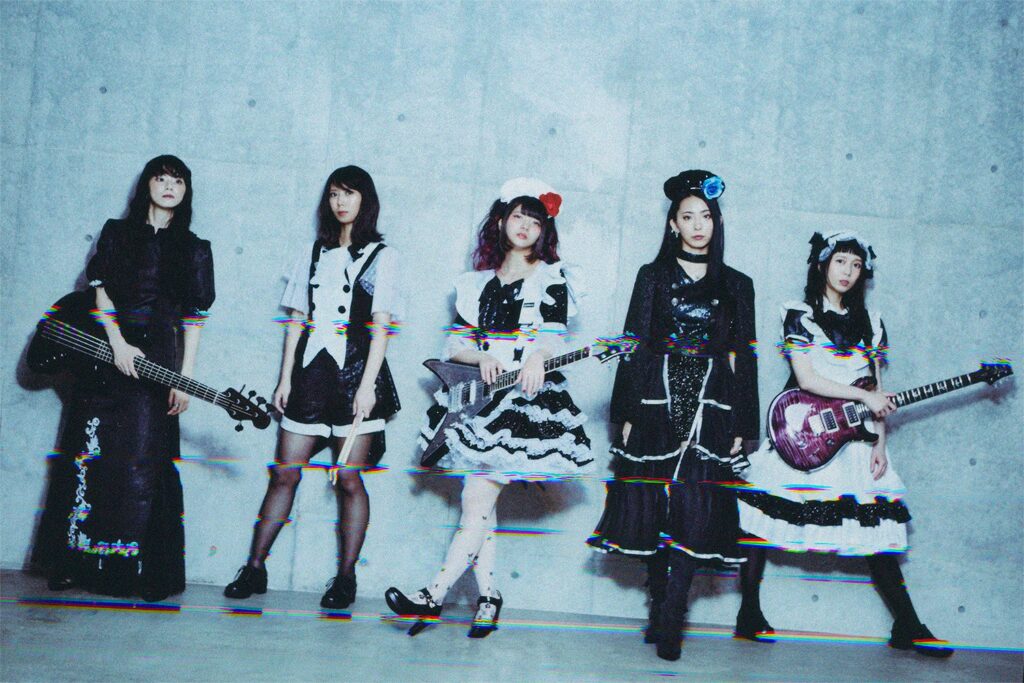BAND-MAID is a Japanese band attracting many fans from all over the world, that plays hard rock while dressed as maids. The band is comprised of five members, starting from guitarist, lead singer and lyricist, Miku Kobato, guitarist and songwriter, KANAMI, drummer AKANE, bassist MISA, and another lead singer SAIKI. They are taking over the world with all their world tour shows in the US, the UK, and Europe being sold out. Recently, they are becoming even more recognized from their appearance in the Netflix original film, Kate, which came out this September.
In Part.1, we sat down with Kobato and SAIKI and talked under the theme, “why is BAND-MAID so popular overseas?” We had them reflect back on their times since they started the band, and speak about how they became known overseas, their shows outside of Japan, and their sentiments embedded in their Japanese lyrics.
――It’s been nine years since you started BAND-MAID. You’re still in the midst of your global invasion, but looking back from where you started, don’t you think you’ve come a long way and accomplish a lot already?
Miku Kobato (from hereunder, Kobato): Actually, BAND-MAID was about to end after two years of starting the band. But we were saved by our overseas audience, and we were able to continue as we were getting good responses from them. If our old selves saw us, I don’t think we would be like, “it’s impressive you’ve come this far,” but instead, they’d be surprised like “wow, you guys are doing this for nine years!?”
SAIKI: We’ve never really told this story before [laughs].
――I didn’t know about it! Was it the “Thrill” MV that made you to be recognized overseas?
Kobato: That’s right. If we didn’t have that, the band was going to end.
SAIKI: But back then, we still didn’t know about it, and we were told sometime later, “that was going to be your last release.” And we all went, “What!?”
Kobato: One day, the head of our agency told us so, and we were all surprised like, “are you serious!?”
SAIKI: Then, we all sighed, “aren’t we glad we made it further…” [laughs]. So, we’re here all because of “Thrill.”
――You can never guess what’s going to happen. Thinking back, other than the novelty of the band’s visual presentation, what do you think fascinated the overseas audience?
Kobato: I think the difference between our music and how we look is interesting to them. We got a lot of comments saying, “are they really playing those instruments!?” People were shocked seeing us girls dressed in cute clothes rocking the instruments. I think people aren’t still use to it.
――So in that sense, without this winning strategy, you might have not been recognized, even if you still played good music.
Kobato: People overseas knew maids were a thing in Japanese culture, so many people were already curious about us. I think the video was effective.
――I remember that’s how things worked in the 2010s.
SAIKI: We wouldn’t be here, if we didn’t put out that video.
――Were there any other interesting things people from abroad said to you?
Kobato: Yes, things like, “‘Thrill’ has an American rock vibe.” Also, each member has a unique persona, and since I was using Rickenbacker, someone said something like, “they are the Japanese Beatles!” [laughs]. Ever since SHOW-YA, there weren’t that many girls doing hard rock in Japan, so people were surprised when they saw us and said, “can’t believe there’s a rock band like this in Japan!”
Going worldwide was our goal from the start
――Before this interview, I re-read an interview I did with you five years ago for a different media, and it didn’t feel much different from now.
SAIKI: Oh wow [laughs].
Kobato: So, you mean we haven’t changed?
――You were saying things like you wanted to go international or “one day we want to be able to write songs on our own,” because back then, you were commissioning other songwriters to write your songs. So, what I meant was that you always had a clear vision of yourselves.
Kobato: We had never imagined we’d be this far, but we’ve been saying that we want to go global and had a big goal since the beginning.
SAIKI: Other than the big goals, we talked about smaller goals as well, and we found out that all five of us unanimously wanted to do the same type of music, so that made us easy to move forward. You see, with bands, if there’s one member that’s off, that just messes up the entire band [laughs]. But with BAND-MAID, that has never been the case.
Kobato: That’s true.
SAIKI: It may be weird to say this ourselves, but we’re all quite serious that people tell us, “You guys need to have more fun!” We’re determined and have a lot of pride in what we do, and I think that’s what’s good about us.
――Jrock Rock, that introduced the “Thrill” MV to the world, was the reason you decided to pursue hard rock, right?
Kobato: That’s right!
SAIKI: We were so surprised [laughs].
Kobato: I know! All of the sudden, we had so many followers from abroad on our socials, and we were saying, “is our account hacked!?” But KANAMI first found out that it’s because of Jrock Radio [playing the “Thrill” MV on their show].
SAIKI: Yes.
Kobato: Then we were relieved like, “so glad, our account wasn’t hacked.” It was that random.
――So they played your music without giving you a heads up.
SAIKI: Apparently, they did write us an email, but it was in English and our manager at that time thought it was a “bad” email, so he just ignored it.
Kobato: At that time, we weren’t doing anything to approach the international market, so we weren’t expecting to receive any email from abroad.
SAIKI: I wonder how they found out about us. I think I asked before, but I forgot [laughs].
Kobato: Me too.
The first overseas concert was in Mexico
――And that opportunity led you to perform outside of Japan, but at that time, you didn’t know much about how to perform on international stages. How did you deal with it?
SAIKI: In the beginning, it was a lot of work buying supplies for our international shows. We had no clue what we were able to buy abroad or what we had to bring from Japan.
Kobato: But thankfully, our first Okyu-ji (show) abroad was at a big event (Sakura-Con that was held in Seattle, Washington, in March 2016) and they had prepared most of the stuff we needed on site, so that made it easy for us. There were still couple things we later thought we needed, but we made note of that for next time.
SAIKI: Though, we still need to work on our heavy baggage!
Kobato: We always take up so much time at the airport.
SAIKI: In the beginning, we used to take about six hours to check-in at the airport.
――What!? Is that when you had to fly for your first Okyu-ji in 2016?
Kobato: That’s right. It was the toughest when we had to fly for our show in Mexico. I was like, “gears can go in here…but wait, then my clothes won’t fit in the suitcase!” Back then, my suitcase wasn’t that big, so packing was crazy for me. I had to bring in a huge carryon bag.
――By the way, it’s amazing how your first-ever overseas solo Okyu-ji was in Mexico.
Kobato: When we were suddenly told, “you guys are playing in Mexico,” our reaction was like, “what!? Mexico!?” Back then, we had more fans in Mexico than in the US.
After the Jrock radio thing, we increasingly got messages from people in Mexico, and a promoter in Mexico liked us a lot and told us, “Since you have so many fans in Mexico, we’d love for you to come to Mexico!” But we had never imagined that Mexico would be our first country, and we were told that it was going to be a thousand capacity venue. At that time, we hadn’t done shows that big even in Japan. So, we were like, “what if they [our masters and princesses] were just up in the front row?” But the actual show was packed, and we were so incredibly surprised!
SAIKI: We felt welcomed, and they were all raving, so we were able to have a great time.
Kobato: They were raving over all our songs.
SAIKI: The crowd was different from the crowds in Japan, so in a good way, we felt a difference from our shows in Japan.
――Usually, artists gain confidence from performing in Japan, and then they’d be like, “alright, let’s go overseas!” But in BAND-MAID’s case, it’s the opposite—you came back gaining confidence from performing outside of Japan [laughs].
SAIKI: Because of our experiences overseas, we became strong-hearted, so even if trouble occurs during our tour in Japan, we’d be like, “it’s nothing compared to what we’ve been through before.” We’re like, “at least we can rehearse! We’re grateful!” [laughs].
Kobato: We’re also more appreciative of things like, “thank god, we can communicate in Japanese!”
SAIKI: The rehearsal before our overseas tour was like, “alright! We’re gonna do this!” [laughs].
Kobato: For overseas shows, we had a different motivation. We prepared without expecting to have rehearsals on site. We’ve experienced way too many troubles outside of Japan.
SAIKI: But our world tour in 2019 was great.
Kobato: That was awesome!
SAIKI: That was our first successful tour, although there were many small troubles, like our amp was burning.
Kobato: Oh yeah, our amp burned. I smelled something burning, and it was the amp.
SAIKI: That was in Dallas, US. But that’s about it.
――An amp burning is no big deal to you.
Kobato: After all, it became not much a big deal for us!
Writing songs thinking of overseas and being particular with the Japanese lyrics
――Since you started touring overseas, do you think about overseas audience when writing songs?
Kobato: We do! Audience outside of Japan do a lot of call-and-response, so we decided to have more singalong songs, and with lyrics, we try to have more parts that are easier to sing even for people who don’t speak Japanese.
――But, you decided to keep singing in Japanese. Kobato: That’s right. In fact, many people abroad tell us that they like the songs in Japanese. There are a lot of people studying Japanese from our lyrics and asking us what the kanji used in our lyrics mean, so we were like, “let’s cherish the language, and keep writing in Japanese.”
――In the past, people tended to think that they had to make the lyrics in English in order to go worldwide.
Kobato: We never cared from the beginning, and always wrote lyrics in Japanese.
SAIKI: Since we’re Japanese, it’s easier to express the nuances and close to what we truly want to convey in Japanese. People can interpret the lyrics however they want, but we don’t want them to take the lyrics in the way we don’t intend, so in order to avert that risk, we choose to write in Japanese.
――It’s also easier to put out your emotions in Japanese.
SAIK: I agree. Hearing us live, people can feel the depth of the language through things like intonation. So, we will sing in English for the parts we want to express in English, and in Japanese for the parts we want to express in Japanese. Also, by doing so, we wanted to boost the level our freedom of expression.
――So, the parts in English are deliberately in English.
Kobato: That’s right. We decide like, “this part should be in English.”
SAIKI: There are different intonations in both English and Japanese. When we listen to a melody that KANAMI brings, the song is going to sound good if it’s made based on whether we think the song has an English vibe or a Japanese vibe. BAND-MAID songs are so calorie-consuming in general, with many words and notes, so we try to write lyrics that are easy for people to listen.
BAND-MAID
A hard rock band from Japan formed in 2013. Consisted of five members: Miku Kobato (guitar/lead singer), SAIKI (lead singer), KANAMI (guitar), AKANE (drums), and MISA (base). With their heavy rock sound, opposed to their appearance as maids, they are gaining fans and garnering media attention from all around the world, and have reached over 100-million total YouTube views. In 2019, they announced tour partnership with the world’s largest event promoter, Live Nation, and released the album, Conqueror, produced by the legendary rock producer, Tony Visconti. In January 2021, they released their 4th album, Unseen World, and made an appearance in the Netflix original film, Kate, that came out in September. On September 6th, they released “Sense (TV Size Ver.)”—an opening theme song for the TV anime series, Platinum End—on streaming platforms; a CD single of “Sense” is coming out on October 27th.
BAND-MAID「Sense TV Size Ver.」:https://lnk.to/Sense_TVSizehttps://bandmaid.tokyo
Twitter:@bandmaid
Facebook:@BAND-MAID
Instagram:@bandmaid.jp
YouTube:https://www.youtube.com/channel/UCJToUvYrmkmTCR-bluEaQfA
Photography Akihito Igarashi(SIGNO)
Translation Ai Kaneda

